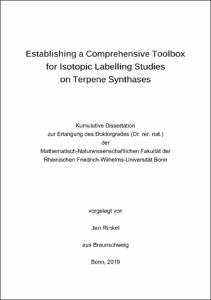Rinkel, Jan: Establishing a Comprehensive Toolbox for Isotopic Labelling Studies on Terpene Synthases. - Bonn, 2019. - Dissertation, Rheinische Friedrich-Wilhelms-Universität Bonn.
Online-Ausgabe in bonndoc: https://nbn-resolving.org/urn:nbn:de:hbz:5n-56436
Online-Ausgabe in bonndoc: https://nbn-resolving.org/urn:nbn:de:hbz:5n-56436
@phdthesis{handle:20.500.11811/8105,
urn: https://nbn-resolving.org/urn:nbn:de:hbz:5n-56436,
author = {{Jan Rinkel}},
title = {Establishing a Comprehensive Toolbox for Isotopic Labelling Studies on Terpene Synthases},
school = {Rheinische Friedrich-Wilhelms-Universität Bonn},
year = 2019,
month = nov,
note = {The cumulative doctoral thesis "Establishing a Comprehensive Toolbox for Isotopic Labelling Studies on Terpene Synthases" describes the synthesis and application of isotopically labelled compounds for the systematic in vitro investigation of recombinant terpene synthases to target both cyclisation mechanism and product structure. Methodically, the known approach of enantioselectively deuterated oligoprenyl diphosphate substrates was further developed by the addition of 13C-labelling, which led to a more sensitive detection of the labelled product by NMR. With a stereochemical anchor of known absolute configuration installed in the substrate and untouched by the enzymatic cyclisation mechanism, it is possible to infer the absolute configuration of the terpene product by following the incorporation of deuterium into the diastereotopic hydrogen positions. By combining chemical and enzymatic synthesis, it was finally possible to label every methylene group of the common terpene precursors by 13C and 2H in an enantioselective fashion. These extensions improve both feasibility and robustness of this method, which contributes to the challenging structure elucidation of terpene natural products, including their difficult to address absolute configurations. Depending on the cyclisation mechanism, also the stereochemical course of hydrogen movements can be delineated.
Connected to the expanding labelling possibilities, several newly identified terpene synthases from bacteria and fungi have been addressed covering various aspects of their catalysis such as substrate or product specificity, repetitive mechanistic motifs and stereochemical issues. The structural variety of the known and newly identified natural products thereby inspired further studies like tailored labelling experiments, site-directed mutagenesis, chemical modifications and the investigation of EI-MS fragmentation mechanisms. With few publications dealing with other aspects of natural product chemistry such as fungal aromatic volatiles, lignin degradation and selected aspects of the secondary metabolism of marine Roseobacter group bacteria also being included in this work, the main focus lays on a deepened understanding of terpene synthase reactions. The isotopically labelled substrates introduced in this study thereby represent a valuable experimental tool towards a comprehensive picture of these astonishing enzymes that create the largest group of natural products.},
url = {https://hdl.handle.net/20.500.11811/8105}
}
urn: https://nbn-resolving.org/urn:nbn:de:hbz:5n-56436,
author = {{Jan Rinkel}},
title = {Establishing a Comprehensive Toolbox for Isotopic Labelling Studies on Terpene Synthases},
school = {Rheinische Friedrich-Wilhelms-Universität Bonn},
year = 2019,
month = nov,
note = {The cumulative doctoral thesis "Establishing a Comprehensive Toolbox for Isotopic Labelling Studies on Terpene Synthases" describes the synthesis and application of isotopically labelled compounds for the systematic in vitro investigation of recombinant terpene synthases to target both cyclisation mechanism and product structure. Methodically, the known approach of enantioselectively deuterated oligoprenyl diphosphate substrates was further developed by the addition of 13C-labelling, which led to a more sensitive detection of the labelled product by NMR. With a stereochemical anchor of known absolute configuration installed in the substrate and untouched by the enzymatic cyclisation mechanism, it is possible to infer the absolute configuration of the terpene product by following the incorporation of deuterium into the diastereotopic hydrogen positions. By combining chemical and enzymatic synthesis, it was finally possible to label every methylene group of the common terpene precursors by 13C and 2H in an enantioselective fashion. These extensions improve both feasibility and robustness of this method, which contributes to the challenging structure elucidation of terpene natural products, including their difficult to address absolute configurations. Depending on the cyclisation mechanism, also the stereochemical course of hydrogen movements can be delineated.
Connected to the expanding labelling possibilities, several newly identified terpene synthases from bacteria and fungi have been addressed covering various aspects of their catalysis such as substrate or product specificity, repetitive mechanistic motifs and stereochemical issues. The structural variety of the known and newly identified natural products thereby inspired further studies like tailored labelling experiments, site-directed mutagenesis, chemical modifications and the investigation of EI-MS fragmentation mechanisms. With few publications dealing with other aspects of natural product chemistry such as fungal aromatic volatiles, lignin degradation and selected aspects of the secondary metabolism of marine Roseobacter group bacteria also being included in this work, the main focus lays on a deepened understanding of terpene synthase reactions. The isotopically labelled substrates introduced in this study thereby represent a valuable experimental tool towards a comprehensive picture of these astonishing enzymes that create the largest group of natural products.},
url = {https://hdl.handle.net/20.500.11811/8105}
}






